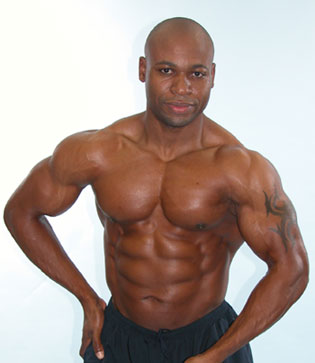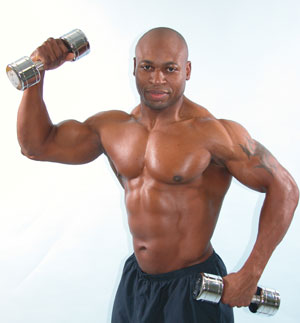|
When One Side Of a Muscle Group Is Smaller Than The Other
- How To Train to Fix It
 Everybody's got them. Sometimes you notice them, sometimes you don't. But there is nothing strange about having one side smaller or less developed than the other! It can happen for a variety of reasons, including genetics, reduced circulation or innervation (which is basically the amount of nerves going to the muscle) to the smaller muscle, previous injuries, or even small anatomical differences.
Everybody's got them. Sometimes you notice them, sometimes you don't. But there is nothing strange about having one side smaller or less developed than the other! It can happen for a variety of reasons, including genetics, reduced circulation or innervation (which is basically the amount of nerves going to the muscle) to the smaller muscle, previous injuries, or even small anatomical differences.
If you've got a significant size or strength difference between sides, this information is for you. The following techniques will help you to even out those lagging bodyparts once and for all!
These techniques can be incorporated into your regular workouts very easily, allowing you to quickly bring up those smaller, less-developed bodyparts. Several of the techniques work by increasing training volume, some work by increasing resistance, while others work by targeting the specific physiological causes of the difference (circulation and innervation).
1. "One and Two and One" Reps
This is a dumbell technique that increases the training volume for the smaller muscle. For this technique, you'll use the same dumbells in both hands.
Start with one rep with the one arm of the smaller part. For example, if you're doing curls, do one dumbell curl with your left arm. Now do a single rep with BOTH arms (right and left) at the same time. Immediately do another rep with the smaller arm again. Your smaller bodypart will end up getting 50% more work than the larger side.
2. "One and Two and One" Sets
This approach is very similar to the rep technique explained above. This time, however, you will do one set of an exercise for just that single side, rest, then do a set that works both sides. Then you'll go back and do a set with just the smaller side again. This will also increase the "smaller-side" workload by about 50%.
This approach also utilizes dumbells rather than barbells in order to allow for single-limb movements.
This "staggered set" approach is more effective for leg exercises than the "staggered rep" technique explained above simply because it's tough to find an exercise that you can do the "rep" technique effectively with. For legs, you will follow the exact same routine, doing a single-leg set, then a double-leg set, then a single leg set.
3. Uneven Weights
To do this technique, hold a dumbell that is somewhat heavier in the hand of your weaker side. This can be a 5 to 10 pound or more difference, depending on the exercise. Do your set as you normally would but stop completely when your weak side can't continue.
This technique increases the resistance on the weaker side, helping to bring it up to the level of the stronger side. Stopping the exercise when the weak side is fatigued ensures that the strong side does not get stimulated as much. This allows the weaker side to more easily catch up.
4. Use Dumbells For All Your Exercises
 Dumbells force each side of the body to take full responsibility for their part in the movement. When using machines or barbells, the strong side can have a tendency to take over the movement and assist the weak side, limiting its development.
Dumbells force each side of the body to take full responsibility for their part in the movement. When using machines or barbells, the strong side can have a tendency to take over the movement and assist the weak side, limiting its development.
Simply switching to completely dumbell-based training for a period of time can help bring up the lagging part quickly without even having to use these special techniques.
5. Targeted Negatives
Finish each bodypart workout with a single set of negative training for the weak side limb. For example, if your left bicep is weaker, when you've finished your regular bicep workout, do one set of negative-only training for the left bicep.
One of my favorite ways to do negative training for biceps is using the Preacher Bench. The bench allows you to stabilize your upper arm more effectively than if you are standing.
Sit in the bench and hold a heavy dumbell in one hand (the weight should just a little higher than your 1 rep max). Now use your other arm to help with the "up" phase of the movement.
Once you're at the top, start to lower the weight down. Fight gravity all the way down - don't just try and slow the weight down...actively try and lift it up while gravity is forcing it down. This is the most effective way to execute negative training. Have your free hand ready to slow the dumbell to keep it from slamming your arm down if you lose strength.
This technique will help to build strength in the target muscle, helping to address the innervation issues that may be causing the lagging development.
6. Targeted High-Rep Training
Start each bodypart workout with one light, high-rep set for the weak side muscle. For example, for a smaller or weaker right tricep, start each tricep workout with one set of high-rep single-arm pushdowns. High-rep in this case means 50+ reps.
This very high rep set will help to increase circulation to the target muscle, improving its ability to gain mass. This increase in circulation means more available blood, which means more nutrients get to the muscle, which means more muscle growth!
If you've got a lesser-developed muscle on one side of your body, give these training techniques a try. They can help you rapidly even out differences between your two sides.

More Articles by Author Nick Nilsson
Return To Weight Lifting Articles Archive
|